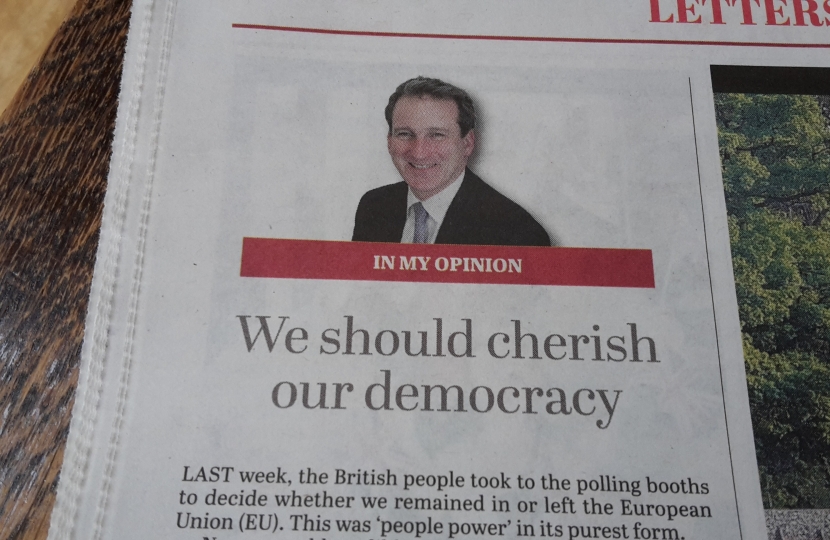
Damain writes about the role of democracy in the outcome of the EU Referendum in today's edition of the Petersfield Post:
Last week, the British people took to the polling booths to decide whether we remained in or left the European Union; this was ‘people power’ in its purest form.
No one could credibly suggest that the key arguments, including the risks, had not been set out. Every adult was entitled to vote and the turnout was high.
To quote Abraham Lincoln, democracy is ‘government of the people, by the people and for the people’. It is underpinned by a fundamental premise of equality, so everyone has an equal stake and voice. That sometimes makes it a difficult system of government but it is one that we should cherish.
There are in fact many theoretical forms of democracy. As a rule, ours operates as a representative liberal democracy, with a party system. I say “ours” but in fact this is true of just about every mature democracy in the world. The alternative of running every major decision by the whole population would be both impractical and unlikely to lead to agreement on the less palatable things governments have to do (like raise revenue).
But political representatives are there by consent; there is no divine right to govern. Mostly this is resolved by periodic general elections where one party or another is elected on an integrated programme for government, the manifesto.
Every so often a big issue comes along that divides people significantly but does not break along party lines. Our membership of the EU (and the issue of immigration with which it is often conflated) is one such case. It was inevitable that this issue would come to a head at some point, and in the absence of a party political divide, the only way to resolve it was a referendum.
The EU Referendum was rightly fought and debated with passion on both sides, but there were moments when tone and language became too much. A democratic society gives us great freedoms – in movement, expression and deed – but with that comes an individual and collective responsibility for respecting and tolerating the movement, expression and deeds of others.
I am one of those bitterly disappointed at the outcome of the Referendum. But it’s up to us all now, to accept it and respect it.
The referendum was a simple in or out question, but there is nothing simple about the work that will now need to take place to secure Britain’s future relationship with Europe and the rest of the world. This is a task that everyone in politics and public life must grasp with positivity.
The referendum on the over-arching question is over and Britain is on a new path. But with many subsidiary questions left to answer, and challenges to face, we all must come together and work with common cause to secure the best possible outcome for our country and society.
Article written by Damian Hinds and published in the Petersfield Post, 29th June 2016

